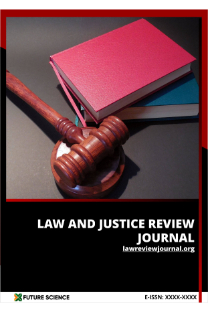The rule of law through international criminal justice mechanisms
___
D Akande, The Legal Nature of Security Council Referrals to the ICC and its Impact on Al-Bashirs Immunities (2009) 7 Journal of International Criminal Justice 333P Akhavan, The International Criminal Tribunal for Rwanda: The Politics and Pragmatics of Punishment, (1996) 90 American Journal of International Law 501
P Allen (2010). Katyń: Stalin's Massacre and the Triumph of Truth. (Northern Illinois University Press, 2010) CF Amerasinghe, Diplomatic Protection (Oxford University Press, 2009)
I Bantekas, Enforcing Human Rights through the External Use of Local Public Opinion, in D Barnheizer (ed.), Effective Strategies for Protecting Human Rights: Economic Sanctions, Use of National Courts and International Fora and Coercive Power (Ashgate, 2002)
I Bantekas, Trust Funds under International Law: Trustee Obligations of the United Nations and International Development Banks (TMC Asser, 2009)
JC Barker, State Immunity, Diplomatic Immunity and Act of State: A Triple Protection against Legal Action? (1998) 47 International & Comparative Law Quarterly 950
CM Bassiouni, The United Nations Commission of Experts Pursuant to Security Council Resolution 780 (1992), (1994) 88 American Journal of International Law 784
RR Baxter, The First Modern Codification of the Law of Armed Conflict, (1963) 29 International Review of the Red Cross 171,
F Biddle, The Nuremberg Trial, (1947) 33 Virginia Law Review 679
N Boister, R Cryer, The Tokyo International Military Tribunal: A Reappraisal (Oxford, Oxford University Press, 2008)
T Buergenthal, The United Nations Truth Commission for El-Salvador, (1994) 27 Vanderbilt Journal of Transnational Law 498
BM Carnahan, Lincoln, Lieber and the Laws of War: The Origins and Limits of the Principle of Military Necessity, (1998) 92 American Journal of International Law 213
Z Deen-Racsmany, Diplomatic Protection and International Criminal Law: Can the Gap Be Bridged, (2007) 20 Leiden Journal of International Law 909
E De Wet, The Chapter VII Powers of the United Nations Security Council (Hart, 2004)
GIAD Draper, The Interaction of Christianity and Chivalry in the Historical Development of the Law of War, (1965) 3 International Review of the Red Cross 19
O Dubois, Rwandas National Criminal Courts and the International Tribunal, (1997) 321 International Review of the Red Cross 717
JM Farrall, United Nations Sanctions and the Rule of Law (Cambridge University Press, 2007)
G Finch, The Nuremberg Trial and International Law, (1947) 41 American Journal of International Law 20
T Franck, The Emerging Right to Democratic Governance, (1992) 86 American Journal of International Law 46
G George, The League of Nations, 1929 to 1946 (Avery Publishing, 1996)
C Gray, International Law and the Use of Force (Oxford University Press, 2004)
M Happold, Child Soldiers in International Law (Manchester University Press, 2005)
MH Keen, The Laws of War in the Late Middle Ages (Routledge, London, 1965)
E Kontorovich, The Piracy Analogy: Modern Universal Jurisdictions Hollow Foundation (2004) 45 Harvard International Law Journal 183
T Klosterman, The Feasibility and Propriety of a Truth Commission in Cambodia: Too Little? Too Late? (1998) 15 Arizona Journal of International & Comparative Law 2
R Kushen and KJ Harris, Surrender of Fugitives by the United States to the War Crimes Tribunals for Yugoslavia and Rwanda, (1996) 90 American Journal of International Law 510
G Manner, The Legal Nature and Punishment of Criminal Acts of Violence Contrary to the Laws of War, (1943) 37 American Journal of International Law 414
BN McGonigle, Two for the Price of One: Attempts by the Extraordinary Chambers in the Courts of Cambodia to Combine Retributive and Restorative Justice Principle, (2009) 22 Leiden Journal of International Law 127
F Megret, A Special Tribunal for Lebanon: The UN Security Council and the Emancipation of International Criminal Justice, (2008) 21 Leiden Journal of International Law 485
T Meron, The Geneva Conventions as Customary Law, (1987) 81 American Journal of International Law 348
P Parker, The Politics of Indemnities: Truth Telling and Reconciliation in South Africa, (1996) 17 Human Rights Law Journal 1
J Pettifer, The Albanian Elections: Electoral Manipulation, the Media and the OSCE, (1996) 1 Mediterranean Politics 388
J Raz, The Rule of Law and its Virtue, in J Raz, The Authority of Law: Essays on Law and Morality (Clarendon Press, 1979)
M Scharf, The Case for a Permanent International Truth Commission, (1997) 8 Duke Journal of International & Comparative Law 1
B Tamanaha, On the Rule of Law (Cambridge University Press, 2004); see M Horwitz, The Rule of Law: An Unqualified Human Good? (1977) 86 Yale Law Journal 561
FK Tiba, The Mengistu Genocide Trial in Ethiopia, (2007) 5 Journal of International Criminal Justice 513
CP Trumbull, The Victims or Victim Participation in International Criminal Proceedings, (2008) 29 Michigan Journal of International Law 779
C Warbrick, Co-operation with the International Criminal Tribunal for Yugoslavia, (1996) 45 International & Comparative Law Quarterly 945
LS Wexler, The Interpretation of the Nuremberg Principles by the French Court of Cassation: From Touvier to Barbie and back Again, (1994) 32 Columbia Journal of Transnational Law 289
A Weyembergh, Approximation of Criminal Laws, the Constitutional Treaty and the Hague Programme, (2005) 42 Common Market Law Review 1567
Q Wright, The Law of the Nuremberg Trial, (1947) 41 American Journal of International Law 38
T Yin, Boumediene and Lawfare, (2009) 43 University of Richmond Law Review 865
- ISSN: 1309-9485
- Yayın Aralığı: 2
- Başlangıç: 2010
- Yayıncı: Türkiye Adalet Akademisi
A restorative justice approach to working with children in residential care
The rule of law through international criminal justice mechanisms
Uber strafrechtliche fragen des sportrechts
Zur gegenwärtigen Deutschen diskussion über willensfreiheit und strafrecht
Globalization and legal education- a Japanese perspective
Toshiyuki KONO, Caslav PEJOVIC, Mark FENWICK
La laïcité Française à l'épreuve du port du foulard islamique et de celui de la burqa
